|
|
|
Sort Order |
|
|
|
Items / Page
|
|
|
|
|
|
|
| Srl | Item |
| 1 |
ID:
181465


|
|
|
|
|
| Summary/Abstract |
To realize the “Green” economic development, China has to transform the extensive mode of growth with the power factor inputs being the main driving force gradually into an intensive one. It's important to quantitatively analyze the relationship between the power factor input and economic growth and understand the core factors that affect the coordinated development between them. We introduce the concept of “power dependence,” based on the counter-factual method, use “growth drag” to reflect the dependence of China's economic growth on the power factor input. Based on the measurement of national power dependence, the auto-regressive distributed lag (ARDL) model is used to develop an empirical analysis of its influencing factors, and the robustness of the findings is tested by using the inter-provincial panel data. The findings show that China's economic growth has depended on the power factor input to some extent. According to the results, we propose suggestions from the aspects of promoting economic development, improving the pricing mechanism, adjusting the power generation structure, reasonably regulating the introduction of the foreign direct investment and research and development investment, and optimizing industrial structure to find an effective means to reduce the dependence of China's economic growth on the power factor input.
|
|
|
|
|
|
|
|
|
|
|
|
|
|
|
|
| 2 |
ID:
024329


|
|
|
|
|
| Publication |
New York, Taylor & Francis, 1988.
|
| Description |
xii, 409p.
|
| Standard Number |
0844815926
|
|
|
|
|
|
|
|
|
|
|
|
Copies: C:1/I:0,R:0,Q:0
Circulation
| Accession# | Call# | Current Location | Status | Policy | Location |
| 031429 | 327.174/CAT 031429 | Main | On Shelf | General | |
|
|
|
|
| 3 |
ID:
180005
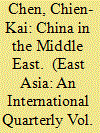

|
|
|
|
|
| Summary/Abstract |
There is an ongoing debate about whether China’s growing economic presence in the Middle East will eventually make it more politically assertive on the Middle Eastern affairs. This paper demonstrates, from a theoretical perspective of “path dependence,” that China’s promotion of the “Five Principles of Peaceful Coexistence” since the 1950s as the guiding doctrine of its foreign relations has forged a “path” for China to follow, along which it has made and repeated promises against interventionism and imperialism to other countries including the Middle Eastern ones. It, in turn, has created a situation where moving away from that “path against interventionism and imperialism” will cause huge damage to China’s reputation as a reliable non-interventionist partner to the Middle Eastern countries, and the “Global South” in general. As a result, China has refrained, and will arguably continue to refrain, from being too politically assertive on the Middle Eastern affairs.
|
|
|
|
|
|
|
|
|
|
|
|
|
|
|
|
| 4 |
ID:
164655


|
|
|
|
|
| Summary/Abstract |
Dependence has been demonstrated to be a main factor driving small states’ alliance contributions. However, the causal pathway linking dependence on the one hand, and small states’ contributions on the other, is seldom explicated and assessed. Furthermore, the ways in which dependence may shape, not only drive, such contributions, have received little attention. The purpose of this article is to elaborate the role of dependence in these regards. Drawing on Glenn H. Snyder’s “fear of abandonment” concept, it is argued that reputation is the main mechanism linking dependence and contributions. The article specifies the causal pathway and assesses it against case-study evidence of Norway’s and Sweden’s military participation in ISAF. The process tracing lends much support to the proposed mechanism, and comparison helps clarify how different alliance relationship status (member or partner) impacts on the theorised causal chain.
|
|
|
|
|
|
|
|
|
|
|
|
|
|
|
|
| 5 |
ID:
113788
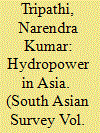

|
|
|
|
|
| Publication |
2010.
|
| Summary/Abstract |
The article seeks to put forward a dynamic conception of construction of issues and their resolution, largely falling under the theoretical rubric of constructivism. The hydropower issues on the Asian continent pertaining to transboundary rivers construct a dynamic binary of dependence and interdependence. Instead of being permanently resolved, as suggested by epistemic community proponents, the issues follow a Hegelian dialectical ontology of problem to solution leading to a new problem. The organisation of the article, built around two foci, India and China, is elliptical. Both countries share transboundary rivers with a number of countries. Most bilateral agreements are, when signed, hailed as the dawn of a new era, before themselves becoming contentious, spawning a new cycle of accusations and counter-accusations. River water issues generate a complex binary of dependence and interdependence, played along the intersection of domestic and international.
|
|
|
|
|
|
|
|
|
|
|
|
|
|
|
|
| 6 |
ID:
192915
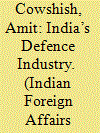

|
|
|
|
|
| Summary/Abstract |
Speaking at the Defence Institute of Advanced Technology (DIAT), Pune,
on May 15, 2023, Defence Minister Rajnath Singh emphasised the urgency
of achieving self-reliance in defence production as continued dependence
on the import of military equipment was affecting the country’s strategic
autonomy. ‘It can’, he added, ‘be a cause for concern for us if our adversary
possesses more advanced technologies’. He was alluding to the potential
threat emanating from indisputable superiority of China in military
technology.
|
|
|
|
|
|
|
|
|
|
|
|
|
|
|
|
| 7 |
ID:
169367
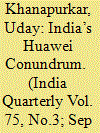

|
|
|
|
|
| Summary/Abstract |
Huawei, the Chinese telecom giant, has emerged as a key player in the provision of infrastructure required to support 5G wireless networks, the adoption of which will be foundational to recipient countries’ deployment of emerging technologies such as artificial intelligence and the Internet of things. At the same time, however, security concerns with respect to Huawei’s ties to the Chinese army and state abound, prompting a number of countries to ban the company from supplying them said telecom infrastructure. India, however, is on the fence in this regard. This article assesses India’s Huawei conundrum through a conceptual framework of economic dependence wherein the costs of a ban and willingness to ban are examined in detail. It is argued that since the expected costs of banning Huawei equipment and the security risks of using them are both substantially high, India’s course of action must be to defer a quick decision and bargain for benefits and assurances.
|
|
|
|
|
|
|
|
|
|
|
|
|
|
|
|
| 8 |
ID:
106318


|
|
|
|
|
| Publication |
2011.
|
| Summary/Abstract |
Themain goal of this paper is to analyze the increasing North Korean dependence on China and provide policy recommendations to deal with it. In the first section, the reality of North Korea behind the rhetoric of "self-reliance" during the cold war is analyzed. In the second section, the rising North Korean overdependence on China is investigated as a new reality between the two countries after the collapse of the Soviet Union. Overdependence comes at the price of vulnerability, a price that Pyongyang dearly paid when Beijing squeezed its vulnerable points during the nuclear crisis. In the third section, the vulnerability of North Korea is analyzed. After experiencing the tightening grip of China, Pyongyang is having second thoughts about its relationship with China. In the fourth section, North Korean efforts to distance itself from Beijing are investigated. Finally, policy recommendations are discussed in the conclusion of the paper to alleviate the North Korean overdependence on China.
|
|
|
|
|
|
|
|
|
|
|
|
|
|
|
|
| 9 |
ID:
192170


|
|
|
|
|
| Summary/Abstract |
This article argues that a peculiar pattern of dependent asymmetry – ‘dual dependence’, i.e. a combination of internal and external dependence – has come to characterize the structure of China-Myanmar relations since the late 1980s. The hypothesis we present is that shifts in this pattern of dependent asymmetry account for fluctuations in China-Myanmar relations between 2011 and 2021. We test this hypothesis against empirical evidence from what we identify as two shifts in the structure of bilateral relations: for each, we trace how structural changes were perceived in Naypyitaw and Beijing, and how such perceptions oriented an adjustment in their respective policies. Myanmar’s reduced external dependence on China in 2011–2012 expanded the set of the potential courses of action available to Myanmar’s decision-makers and reduced the set of those available to China; conversely, the opposite happened in 2017–2018, following Myanmar’s return to full-fledged external dependence on China. The paper finally speculates that the military coup in 2021 could well represent a third shift in the structure of bilateral relations, further strengthening Myanmar’s external dependence on China and constraining the military government’s room of manoeuvre.
|
|
|
|
|
|
|
|
|
|
|
|
|
|
|
|
| 10 |
ID:
099072
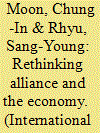

|
|
|
|
|
| Publication |
2010.
|
| Summary/Abstract |
The alliance with the United States has not only provided South Korea with a credible military deterrence against North Korea, but also helped normalize its economy through extensive military and economic assistance and assertive policy intervention for macroeconomic stabilization and export drive. South Korea was also one of major beneficiaries of the American-built liberal international economic order. No matter how strong the alliance tie would be, however, major external economic crises or subsequent critical junctures (e.g. the Asian financial crisis of 1997 and the global financial crisis of 2008) tempted South Korea to seek an alternative arrangement by attempting to depart from the US-led economic and financial architecture. Nevertheless, such moves were fundamentally constrained because of the preference of continuing stability in international economic and financial institutions and its renewed emphasis on the alliance in face of North Korea's nuclear threats. South Korea is likely to adhere to the American-led currency regime for the time being.
|
|
|
|
|
|
|
|
|
|
|
|
|
|
|
|
|
|
|
|
|